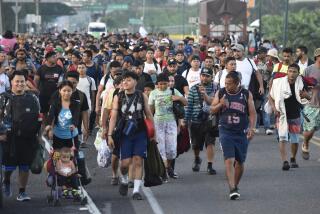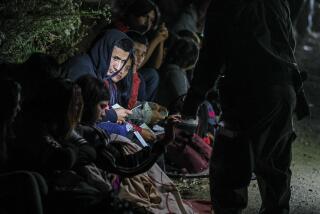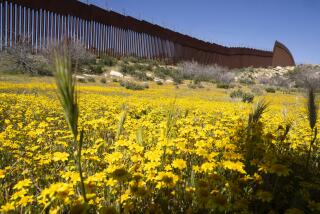Baja, U.S. Officials Unveil Steps to Improve Safety, Lure Tourists Back
- Share via
TIJUANA — In hopes of easing the fears of Californians and others about venturing into Baja California, government officials from both sides of the border announced three measures Wednesday aimed at increasing the safety of tourists.
With promises of even more steps in future months, the binational group announced:
* Two new hotline numbers for tourists to call for help, staffed by bilingual operators with lists of names and numbers of key medical, consulate and law enforcement personnel.
* A pledge of better coordination between U.S. and Mexican officials during medical emergencies.
* Continued discussions with auto insurance companies to urge them to expand the coverage they provide, particularly in case of accidents.
Many Americans are shocked to learn that their U.S. auto policies often do not cover all accidents and do not provide bail requirements for drivers involved in traffic incidents. Also, Mexican authorities require bail be paid in pesos, although dollars are accepted in much of the economy.
After several highly publicized cases of injured Americans enduring delays in getting medical attention, tourism plunged in Baja California by more than 12% late last year and early this year, Mexican officials said at a news conference. Tourism is a $1.2-billion a year industry in Baja.
To win back the hearts, minds and dollars of visitors from El Norte, officials from the Tijuana and Baja California governments joined with their counterparts from the city of San Diego and the office of Gov. Gray Davis to find ways to increase the safety of tourists and the awareness of visitors about differences between U.S. and Mexican law.
Kristen Miller Allioti, director of California-Mexico affairs for Davis, said the effort began in the wake of the “crisis of the Kraft case,”--a reference to Donald Kraft, a San Diego truck driver who died in September 1999 after being injured in a traffic accident north of Ensenada while on a family outing.
Kraft’s family was delayed in taking him to San Diego for medical care because of a Mexican law requiring that a bond be posted by drivers in traffic accidents. The family, now suing various Mexican officials, insists the 18-hour delay caused Kraft’s death from complications from a broken neck.
The San Diego County medical examiner disputes the family’s view that the delay caused the death.
The Kraft incident is a touchy point with Mexican officials, who contend that nothing improper was done but add that the case showed a need to improve emergency procedures.
“I think it was a wake-up call to authorities on both sides of the border that we cannot be confident that everybody along the border knows what to do in an emergency,” said Juan Tintos Funcke, secretary of tourism for Baja California.
Baja Gov. Alejandro Gonzalez said there has been an attempt in the United States to “make a scandal” out of Kraft’s death: “I think it’s very clear that an accident like that could have happened here or in the U.S.”
Allioti said she was surprised about the confusion on both sides of the border about U.S. insurance. “We would ask a question [of officials on both sides of the border] and get two [different] answers,” she said.
San Diego County Supervisor Bill Horn, who did not attend the news conference, said he hopes that the measures “are not just a bunch of words” that will be forgotten when the pressure from the United States subsides. After the Kraft accident, Horn led a campaign to warn Americans about the dangers of traveling in Mexico and to force Mexicans to make greater efforts to assist injured or stranded Americans.
“Hopefully these things will be constructive,” Horn said. “But only time will tell. It’s a different world down there. For a year all we’ve gotten out of the Mexicans is silence.”
The binational group is also involved with efforts to discourage American teenagers from flocking to Tijuana to drink and go wild. Efforts are also underway to spread the word that it is illegal to take firearms into Mexico.
“Mexico and Baja California need tourists,” Funcke said. “But there are rules, regulations and procedures that have to be obeyed.”
*
Special correspondent Laura Castaneda contributed to this story.
More to Read
Sign up for Essential California
The most important California stories and recommendations in your inbox every morning.
You may occasionally receive promotional content from the Los Angeles Times.










